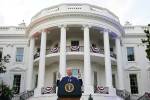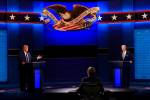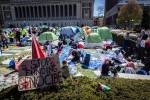Strategies for cutting costs detailed at regents’ meeting
RENO -- Elimination of faculty, employee furloughs, further student fee increases and enrollment caps are all potential solutions to cutting $96 million out of the higher education budget, regents were told Thursday.
Closing campuses, increasing faculty workloads and limiting hours of operation at the Nevada System of Higher Education institutions are also a possibility, said Dan Klaich, executive vice chancellor.
These different "tools in the toolbox" might all have to come up for consideration by the Board of Regents if the higher education system is forced to cut its 2009-11 budget by 14 percent as requested by Gov. Jim Gibbons, he said.
"All of these are subjects that could come up over a period of time," Klaich said. "We don't look forward to that discussion at all."
The ramifications of such budget cuts, which Chancellor Jim Rogers has described as crippling to higher education, were discussed by the board, but no immediate steps were taken to implement any reductions.
The discussion came the same day as Gibbons sat down with lawmakers and other officials to address the state's budget crisis, which he has called the state's worst ever.
The discussion also came at the same time the Board of Regents adopted a budget for the next two years that does not include any of the sought-after spending reductions.
Regents Chairman Michael Wixom said he wanted the original budget approved and in place to use for comparison purposes if the 14 percent cuts become reality.
Klaich said that campus presidents are moving forward with a review of possible cuts, even as the unaltered budget won approval from the board.
One of those potential cuts involves issuing notices of non-renewal to faculty warning them that they might not have jobs come July 1, 2009, he said.
Such notices should be sent out far enough ahead of time to give targeted faculty fair warning of their employment status, Klaich said.
Rogers said the higher education system is operating with limited information.
"We're sitting here with very little information that is specific," he said. "It's very premature at this point to sit down and draw up what the game plan is going to be."
Regent Ron Knecht said the board might want to consider an endorsement of a plan offered by Lt. Gov. Brian Krolicki to use the state's annual tobacco settlement payments to generate up to $775 million in bonds to help keep the state solvent.
Wixom, who attended the budget meeting with Gibbons and lawmakers prior to the regents meeting, said the Krolicki plan is worth exploring, as long as the Governor Guinn Millennium Scholarship for academically qualified Nevada high school graduates is protected. Most of the annual payments to Nevada from the big tobacco companies are now used to pay for the scholarship program, initiated by former Gov. Kenny Guinn and the Legislature in 1999.
Gibbons has asked state agencies as well as higher education and public education to prepare spending plans for the next two-year budget that are as much as 14 percent lower than current funding levels because of lagging tax revenues.
That equates to about $500 million less a year in total for the new budget that will begin on July 1, 2009. The current two-year budget, already approved by the Legislature in 2007 before the economy worsened, ends June 30, 2009.
For the Nevada System of Higher Education, the cut would mean a reduction from the $684 million in general funds allocated to it for fiscal year 2008-09, which begins July 1, of nearly $97 million in each year of the new budget.
The Gibbons administration says the request for the reduced budgets are for planning purposes and not a certainty at this point.
The cuts sought by Gibbons would establish a baseline budget of about $3.2 billion a year to which additional revenues could be added to cover growth in student populations, Medicaid and other caseloads.
The next budget will likely total about $7 billion over two years.
So even with the slowing revenues and cuts sought by Gibbons, the new 2009-11 budget is expected to reflect an overall increase in spending from the current budget when it sees final approval by the Legislature sometime in June 2008. Spending over the current budget as approved by the Legislature last year should increase by at least 3 percent.
But this is small consolation to the Board of Regents.
Regent Cedric Crear said Gibbons is not to blame for the state's economic troubles, but he has failed to show any leadership on how to deal with the crisis. The only reaction from Gibbons is to cut, he said.
"We have to take drastic action," Crear said.
Students and faculty need to let their views be known, he said.
Knecht disagreed that Gibbons is failing to show leadership. Nevada families are facing the same cutbacks as the higher education system, he said.
A tax increase on families in the current crisis would be "callous," Knecht said.
Wixom said he will work with Rogers in the coming months to propose some solutions to the budget dilemma in an effort to avoid major disruptions to higher education.
But tax revenues are not likely to turn positive anytime soon, he said.
"The issue is preserving ourselves, enhancing ourselves," Wixom said. "This is dangerous stuff. It's not like we're dealing with a luxury that we can simply do without. We're dealing with a necessity in terms of what we can do for our children and what we can do for the state."
Contact Capital Bureau reporter Sean Whaley at swhaley@reviewjournal.com or 774-687-3900.























